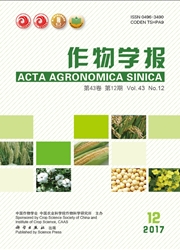

 中文摘要:
中文摘要:
采用超声波辅助花粉介导植物转基因方法,将甜菜碱醛脱氢酶(BADH)基因导入玉米自交系郑58,获得了耐盐性强的转基因玉米植株。经卡那霉素抗性初筛、PCR扩增、Southern blot分析,证明BADH基因已导入转化植株并整合到其基因组中。用不同浓度的NaCl溶液对T2代转基因玉米植株与对照进行盐胁迫处理,结果表明,转BADH基因玉米植株表现出一定的抗逆性,生长状况明显优于对照;根据非转化苗对 NaCl 的反应以及生长状况,确定250 mmol L^–1 NaCl溶液为玉米幼苗耐盐性筛选的适宜浓度;依据此临界浓度下形态指标和生理生化指标的测定结果,与对照相比,转基因植株的株高提高10.94%-25.70%,鲜重增加8.62%-18.20%,干重增加9.00%-18.18%,相对电导率降低37.21%-58.14%,叶绿素含量增加15.89%-90.65%,超氧化物歧化酶(SOD)活性提高64.92%-148.29%,丙二醛(MDA)含量减少26.97%-48.05%。综上所述,转入甜菜碱醛脱氢酶(BADH)基因提高了玉米的耐盐性。这是首例将BADH基因导入优良玉米自交系郑58的报道。超声波辅助花粉介导法是一种经济、高效、实用和无基因型依赖性的植物基因转化方法。
 英文摘要:
英文摘要:
In order to obtain transgenic maize plants tolerant to salt stress, maize inbred Zheng 58 was transformed with BADH gene using pollen-mediated method. The results of Km-resistant screening, PCR detection and Southern blot analysis proved that BADH gene was introduced into maize plants and integrated into the maize genome. Effects of various concentrations of NaCl solution on the growth of T2 transgenic and non-transgenic maize plants were investigated.The results indicated that transgenic maize seedlings had an improved resistance to salt stress, and their growth performance was superior to that of non-transgenic maize seedlings. On the basis of the growth status of non-transgenic plants, 250 mmol L–1 of NaCl solution was used to screen transgenic plants. An analysis on morphological and physiological indexes under the stress of 250 mmol L^–1 NaCl showed that compared with non-transgenic plants, the seedling height of transgenic plants was increased by 10.94%–25.70%, fresh weight was increased by 8.62%–18.20%, dry weight was increased by 9.00%–18.18%, relative conductivity was decreased by 37.21%–58.14%, chlorophyll content was increased by 15.89%–90.65%, superoxide dismutase (SOD) activity was increased by 64.92%–148.29%, and MDA content was decreased by 26.97%–48.05%. In conclusion, introducing betaine aldehyde dehydrogenase (BADH) gene enhances salt tolerance in maize plants. This is the first report on introducing BADH gene into the elite maize inbred Zheng 58. This study suggests that pollen-mediated transformation approach is an economical, effective and practical plant transformation method without genotype dependence.
 同期刊论文项目
同期刊论文项目
 同项目期刊论文
同项目期刊论文
 期刊信息
期刊信息
